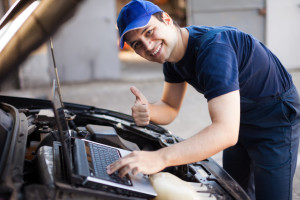From the perspective of the Director of the Automotive Group at RepairPal:
I have been the primary person in charge of RepairPal’s (RP) Certification process for almost 3 years. When I joined the RepairPal team, there were only 150 certified shops, and we processed about five to six new applicants a week. Now, almost 3 years later, we have a rapidly growing network of over 1,400 of the best shops in the country and continue to grow exponentially.
 We aren’t a network in which you pay for your listing and get leads sent in return. We are a certification program that recognizes the shops in this country that are committed to the best practices in auto repair. But what exactly are these “best practices” that we use as a standard for the shops in our network?
We aren’t a network in which you pay for your listing and get leads sent in return. We are a certification program that recognizes the shops in this country that are committed to the best practices in auto repair. But what exactly are these “best practices” that we use as a standard for the shops in our network?
“Best practices” is a term that is often thrown around and that means a lot of different things to a lot of different people. At RepairPal, we use the term to describe what our automotive team has determined makes up a quality automotive repair facility. My team consists of very experienced automotive professionals who have a wide range of experience in the automotive field. This experience, and our talking to thousands of shops across the country, has helped us develop a process by which we identify auto repair shops that are committed to staying relevant and forward-thinking in our rapidly changing industry.
Here are a few best practices we look for in an auto repair shop when going through the certification process.
High-Quality Training
A history of consistent, ongoing training is a cornerstone of our program. We look for shops that continuously attend good-quality management and technician training classes. High-quality instructor-led training by AdvisorFix, ATI, Elite, The Institute, Napa, AC Delco, WorldPac, Carquest, O’Reilly, and other providers is the type of investment we are looking for. Computer-based training by providers, such as AVI OnDemand, MotoSkills, AC Delco online, are also good alternatives for shops in remote areas, shops that are constantly busy, or shops that do not have convenient access to instructor-led training. This investment in the culture of the shop is key to becoming RepairPal Certified.
High-Quality Tools
Investment in quality tools and equipment is also important. The amount of technology in today’s vehicles makes having the right scan tools and equipment critical to the successful diagnosis and repair of modern vehicles. OE-level scan tools, evaporative system testers, up-to-date A/C equipment, and TPMS reset equipment are basic tools a successful shop will have available. Without the above equipment, you will remain unsuccessful and unprepared in today’s market.
New tools and technology are always coming to market, and shops that invest in these tools are providing their consumers with more accurate diagnoses and better-quality repairs. Shops that invest in these tools are not just investing in their operations, but also in their customers.
High-Quality Reviews
Verified customer reviews are something that we stand firmly by when certifying new auto repair shops. We’re not just looking at reviews imported from Yelp, Google, or other review sites; we make sure that the reviews we get are from actual customers who have had repairs at the location and have received quality service.
We only want the shops that treat their customers with the utmost respect and fairness. We run thousands of shops through our secure certification process and have been successful in finding the best shops in the country for consumers. This is a non-negotiable part of our process, and it is what makes us distinctly different from other programs.
Other Considerations
Other things we consider are the length of time in business, as well as employee tenure and experience. Our process is complete and thorough, designed to find all-around great shops that invest in themselves to deliver the best experience possible to their customers. It is an ongoing commitment, and not every shop has made this level of commitment.
I am not saying that shops that fall short in some of these areas aren’t great shops and aren’t providing quality experiences for their customers. I am saying that we have found that shops that invest in the best practices outlined here have set themselves up to win. They are investing in themselves and their customers, and these are the shops we need for our network to continue growing and thriving. Contact us to learn more about our certification process and what you can do to join the RepairPal ranks.



